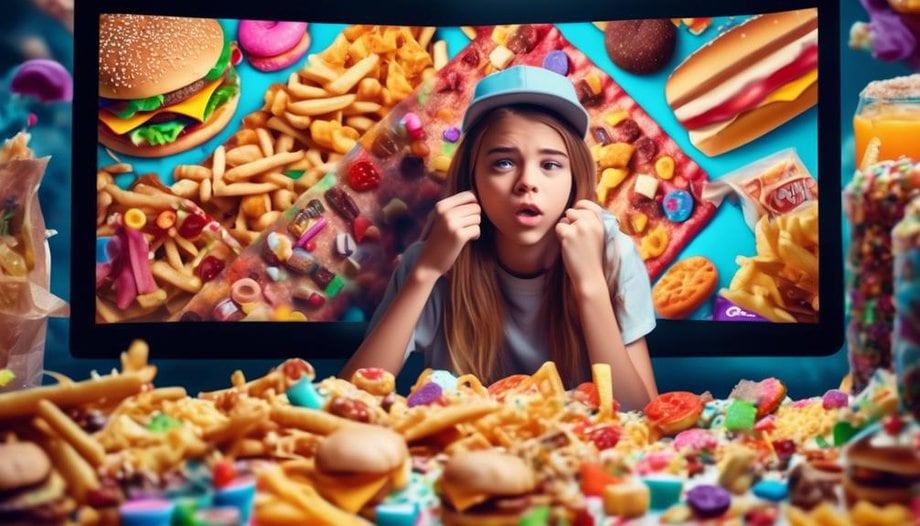Addressing the Impact of Social Media on Teen Eating Habits

Social media has become an integral part of the lives of teenagers, with platforms like Instagram, Snapchat, and TikTok being widely used. However, the impact of social media on teen eating habits is a growing concern. These digital platforms can have a significant influence on what teenagers choose to eat and how they perceive their bodies. The constant exposure to images of perfectly curated meals and idealized body types can lead to unhealthy eating behaviors and body dissatisfaction. It is crucial to understand and address the influence of social media on these aspects in order to promote healthy eating habits and positive body image among teenagers.
One way social media affects teen eating habits is through the promotion of unrealistic and unhealthy food trends. Popular influencers often endorse fad diets or extreme eating habits, which can be harmful to teenagers who are more vulnerable to such trends. Additionally, the constant stream of images depicting highly processed and aesthetically appealing foods can lead to a desire to replicate these meals, often disregarding nutritional value. This can result in poor dietary choices and a lack of understanding about balanced eating.
Moreover, social media platforms contribute to the development of body dissatisfaction among teenagers. The constant exposure to images of seemingly perfect bodies can create unrealistic standards of beauty and lead to negative self-perception. Teenagers may compare themselves to the edited and filtered images they see online, which can negatively impact their body image and self-esteem. This, in turn, can contribute to the development of disordered eating habits such as restrictive eating or excessive exercise.
To address the influence of social media on teen eating habits, it is essential to promote media literacy and critical thinking skills. By educating teenagers about the potential pitfalls of social media and encouraging them to question and analyze the content they consume, they can develop a more realistic understanding of food and body image. Additionally, schools, parents, and healthcare professionals should provide resources and support to help teenagers develop a healthy relationship with food and their bodies. This can include promoting balanced eating, fostering a positive body image, and encouraging open conversations about the influence of social media.
In conclusion, the impact of social media on teen eating habits is significant and should not be ignored. By understanding and addressing the influence of digital platforms on food choices and body image, we can work towards promoting healthy eating habits and positive body image among teenagers. Education, support, and critical thinking skills are key in helping teenagers navigate the digital world and develop a healthy relationship with food and themselves.
Social Media's Influence on Body Image
Social media's impact on teen eating habits extends beyond food choices, as it also plays a significant role in shaping body image perceptions. The constant exposure to images and videos on social media, promoting unrealistic body ideals, can lead to body dissatisfaction and the development of eating disorders among adolescents. Research has shown that the more time teenagers spend on social media platforms, the more likely they're to experience dissatisfaction with their own bodies.
Social media creates an environment where comparison and judgment thrive. Adolescents are bombarded with carefully curated images of flawless bodies, leading them to believe that their own bodies are inadequate. This can result in negative self-perception, low self-esteem, and even depression. Furthermore, social media often promotes a narrow definition of beauty, excluding diverse body types and reinforcing harmful stereotypes.
In addition to promoting unrealistic body ideals, social media can also influence teens' eating habits through the endorsement of unhealthy food products. Influencers and celebrities often promote these products, making them seem desirable and normalizing their consumption. As a result, adolescents may be more inclined to make unhealthy food choices, leading to weight gain and potential health issues.
To address the impact of social media on body image, it's crucial for parents, educators, and healthcare professionals to educate teenagers about media literacy and body positivity. Teaching adolescents to critically analyze and question the images they see on social media can help them develop a healthier body image. Encouraging open conversations about body image and self-acceptance can also provide support and guidance for teenagers struggling with their body image perceptions.
Impact of Curated Images on Teen Self-Esteem
Curated images on social media have a significant impact on your self-esteem as a teenager. These carefully selected images often promote unrealistic beauty standards, causing feelings of inadequacy and dissatisfaction with your own appearance.
When you constantly compare yourself to these curated images, it can lead to lowered self-esteem and body image issues, affecting your overall well-being.
Image Influence on Self-Esteem
Exposure to carefully selected images on social media platforms can have a significant impact on the self-esteem of teenagers. The curated images often depict idealized body standards that can negatively influence how teens perceive themselves.
Research shows that exposure to unrealistic body ideals on social media can lead to increased dissatisfaction and negative self-perception among teens. They may feel pressure to conform to these ideals, which can further contribute to low self-esteem.
This influence of curated images on social media can also contribute to the development of disordered eating behaviors and unhealthy body image perceptions in teens.
As parents and educators, it's crucial to address the impact of these images and promote healthy self-esteem practices among teens. Encouraging open discussions, teaching media literacy skills, and fostering a positive body image can help mitigate the negative effects of social media on self-esteem and overall well-being.
Social Media's Self-Perception
The carefully selected images on social media platforms can have a significant impact on how teenagers perceive themselves, often leading to negative self-perception and low self-esteem. Exposure to unrealistic body ideals portrayed on social media can contribute to feelings of inadequacy and dissatisfaction with one's own body. Constant comparison with curated images can further exacerbate these negative emotions, as teens strive to attain unattainable beauty standards. This can result in poor self-perception and body dissatisfaction, which may in turn contribute to the development of disordered eating behaviors and unhealthy eating habits. It is important for teenagers to recognize that the images they see on social media are often heavily edited and do not reflect reality. Encouraging a healthy body image and promoting self-acceptance can help combat the negative impact of social media on teen self-perception.
| FACT | FACT | FACT |
|---|---|---|
| Curated images on social media impact teen self-perception | Exposure to unrealistic body ideals leads to dissatisfaction | Comparison with curated images contributes to negative self-perception |
Peer Pressure and Unhealthy Eating Habits
Peer pressure can heavily influence teenagers' eating habits, leading them to adopt unhealthy dietary choices in order to fit in with their peers. The influence of peers on adolescents' eating behaviors is significant, and social media usage plays a crucial role in amplifying this influence. Social media platforms provide a space for peer influences to shape and reinforce eating habits, both positive and negative.
Research has shown that adolescents are more likely to adopt the eating habits of their peers, indicating the powerful role that peer pressure plays in shaping their dietary choices. This influence can override individual preferences and dietary needs, leading to the adoption of unhealthy eating habits. Social media platforms, with their vast reach and ability to connect individuals, have only intensified the impact of peer pressure on teen eating habits.
The pressure to conform to certain eating patterns, as portrayed by peers on social media, can contribute to the development of disordered eating behaviors among teenagers. This includes practices such as restrictive dieting, excessive exercise, and unhealthy weight control methods. The constant exposure to idealized images of bodies and food choices can create unrealistic expectations and a distorted perception of what constitutes a healthy diet.
To address the negative impact of peer pressure on teen eating habits, it's important for parents, educators, and healthcare providers to promote a healthy and balanced approach to food. Encouraging open discussions about the influence of peers and social media on dietary choices can empower teenagers to make informed decisions and resist unhealthy pressures. Additionally, fostering a positive and supportive environment that celebrates individuality and diverse body types can help counteract the negative effects of peer pressure on eating habits.
The Role of Social Media in Promoting Diet Culture
Amplifying the influence of peer pressure and shaping adolescents' eating behaviors, social media platforms play a significant role in promoting diet culture among teenagers. Social media's impact on teenagers' eating habits is undeniable, with platforms like Instagram, Snapchat, and TikTok bombarding them with images and videos that promote unhealthy food choices and unrealistic body ideals. This exposure can lead to increased consumption of unhealthy foods, as well as contribute to body dissatisfaction and disordered eating behaviors.
One of the ways social media promotes diet culture is through the perpetuation of unrealistic body ideals. Influencers and celebrities often showcase their seemingly perfect bodies, setting unrealistic standards for teenagers. This can lead to body dissatisfaction and a desire to conform to these ideals, which in turn may result in engaging in unhealthy eating habits.
Moreover, social media platforms are a breeding ground for peer pressure. Adolescents are constantly exposed to posts and comments from their peers, which can influence their eating behaviors. When their friends promote restrictive eating or endorse fad diets, teenagers may feel compelled to do the same in order to fit in.
Additionally, social media advertising heavily promotes unhealthy food products to teenagers. These advertisements often glamorize fast food, sugary drinks, and processed snacks, making them appear desirable and enticing. As a result, adolescents may be more likely to consume these unhealthy foods, further contributing to the promotion of diet culture.
To better understand the role of social media in promoting diet culture, let's take a look at a table that summarizes the key points:
| Key Points |
|---|
| Social media platforms promote diet culture among teenagers. |
| Exposure to unrealistic body ideals on social media leads to body dissatisfaction. |
| Peer pressure on social media can encourage unhealthy eating habits. |
| Social media advertising heavily promotes unhealthy food products to adolescents. |
Strategies to Promote Positive Body Image on Social Media
To promote positive body image on social media, there are effective strategies that can be implemented to counteract the negative impact of diet culture.
One strategy is to promote healthy eating by sharing nutritious meal ideas and recipes on social media. By showcasing a variety of delicious and wholesome options, individuals are encouraged to focus on nourishing their bodies rather than restrictive diets.
Additionally, it's important to encourage body positivity by promoting diverse body types and appearances on social media. By celebrating and embracing all shapes and sizes, individuals can develop a more positive relationship with their own bodies.
Another strategy is to share educational resources and evidence-based information about nutrition and healthy eating habits on social media. By providing accurate information, individuals can make informed choices about their eating habits and understand the importance of balance and moderation.
Collaborating with health professionals and influencers is also crucial in creating impactful interventions promoting positive body image on social media. These collaborations can provide expert advice, guidance, and support to individuals struggling with body image issues.
Lastly, engaging in peer support and positive reinforcement for healthy eating behaviors on social media platforms is essential. By creating a supportive community, individuals can find encouragement and motivation to maintain a healthy lifestyle.
Building Resilience Against Negative Social Media Influences
To build resilience against negative social media influences, it's important to develop media literacy skills that enable you to critically evaluate the messages you encounter. By being mindful and intentional in your social media consumption, you can identify harmful content and resist its impact.
Surrounding yourself with a positive online community that promotes healthy eating behaviors and body positivity can also help counteract negative influences.
Remember to prioritize your mental and physical well-being over societal pressures and trends propagated on social media, and seek out credible and evidence-based nutrition information to counteract misinformation.
Media Literacy Skills
Developing media literacy skills is crucial for teenagers to build resilience against negative social media influences on their eating habits.
In today's digital age, social media has a profound impact on how teenagers perceive and engage with food. By honing their media literacy skills, teenagers can learn to critically analyze and evaluate the content they encounter on social media platforms.
They can develop the ability to understand and recognize the persuasive techniques used in social media advertising that promote unhealthy eating habits.
Additionally, media literacy skills enable teenagers to navigate the pressures and influences from their peers regarding eating habits on social media.
By being able to question and challenge unrealistic body ideals perpetuated by social media, teenagers can develop a healthier relationship with food.
Moreover, media literacy empowers teenagers to differentiate between reliable and evidence-based nutrition information and misinformation on social media.
Positive Body Image
Building resilience against negative social media influences is essential for promoting positive body image among teenagers. Here are three practical strategies to help teenagers develop a healthy body image in the face of social media pressures:
- Emphasize individual strengths and qualities: Encourage teenagers to focus on their unique abilities and accomplishments rather than solely on appearance. By highlighting their talents, skills, and positive qualities, they can build self-esteem and reduce the impact of negative social media messages.
- Foster critical thinking and media literacy skills: Empower teenagers to question and analyze the images and messages they encounter on social media. Teaching them to evaluate media content critically can help them identify unrealistic beauty standards and understand the manipulative tactics used by advertisers and influencers.
- Promote diverse representations of beauty and body positivity: Encourage teenagers to follow social media accounts that showcase diverse body types and promote body positivity. By exposing them to a range of healthy body images, they can develop a more inclusive and accepting view of themselves and others.
Healthy Coping Strategies
Counteracting the negative impact of social media on teen eating habits requires the implementation of healthy coping strategies that promote resilience against these influences.
One effective strategy is practicing mindfulness and emotional regulation. Encourage adolescents to be aware of their emotions and thoughts surrounding food, and to cope with stress or negative emotions in healthier ways, such as engaging in physical activity or talking to a trusted adult.
Additionally, it's crucial to provide positive role models and influencers who promote healthy eating. By showcasing individuals who prioritize nourishing their bodies, teens are more likely to adopt similar habits.
Furthermore, countering misinformation is essential. Providing accurate and evidence-based nutrition information on social media platforms can help dispel myths and encourage healthy eating choices.
Establishing peer support and positive reinforcement for healthy eating behaviors on social media can also build resilience against negative influences.
Collaborations between health professionals, educators, and social media influencers can implement impactful interventions to promote healthy coping strategies and support teens in developing positive relationships with food.
To guide and support your teen in navigating social media's impact on their eating habits, it's important to encourage open communication and provide a supportive environment for discussing the influence of social media on their food choices and body image.
Here are three ways you can provide parental guidance and support to help your teen develop healthy eating habits in the age of social media:
- Educate them on media literacy and critical thinking:
Teach your teen to analyze and evaluate social media content related to food and body image. Help them understand the potential for manipulation and the importance of questioning unrealistic portrayals. By developing these skills, they can make informed decisions about the content they consume and its impact on their eating habits.
- Monitor and guide their social media usage:
Keep an eye on your teen's social media activity to ensure they aren't being exposed to content that promotes unhealthy eating habits or unrealistic body ideals. Set limits on screen time and encourage them to follow influencers who promote healthy eating habits and body positivity. Engage in conversations about the content they come across and help them navigate any negative influences.
- Foster a healthy relationship with food and body image:
Encourage your teen to follow positive role models and influencers who advocate for healthy eating habits. Emphasize the importance of nourishing their bodies with wholesome foods and the beauty of diverse body shapes and sizes. By promoting a positive and balanced perspective, you can help them develop a healthy relationship with food and their bodies.
Frequently Asked Questions
What Is the Negative Impact of Social Media on Eating Habits?
Social media negatively impacts your eating habits by promoting unhealthy food, encouraging body image comparison, and popularizing dieting trends. These influences can lead to poor mental health, disordered eating behaviors, and dissatisfaction with your body.
Do You Think the Media Plays Any Role in the Development of Adolescent Eating Disorders?
Social media definitely plays a role in the development of adolescent eating disorders. Celebrities' influence on body image and self-esteem can lead to unhealthy eating habits. It's important to address these issues and promote positive body image on social media.
Can Social Media Influence What Your Child Eats?
Social media can definitely influence what your child eats. As a parent, it's important to be aware of the impact social media has on their choices. By exercising parental control and promoting balanced nutrition, you can help guide their eating habits.
How Has Social Media Impacted Diet Culture?
Social media has transformed diet culture, fueling body image comparison and promoting unrealistic ideals. The body positivity movement fights back, but advertising tactics still push unhealthy choices. It's crucial to navigate this landscape wisely.











